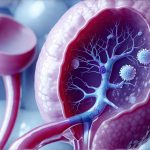Urological inflammation, encompassing conditions like prostatitis, cystitis, and urethritis, can significantly impact quality of life. Often characterized by pain, discomfort, and urinary issues, these inflammations arise from various causes – infection being a prominent one, but also non-infectious factors such as autoimmune responses or nerve damage. Traditional treatment usually involves medication (antibiotics for infections, anti-inflammatories for others), but complementary strategies focusing on lifestyle adjustments can play a vital role in managing symptoms and potentially preventing flare-ups. One often underestimated aspect of these strategies revolves around cooling – not necessarily in the literal sense of lowering body temperature, but more about mitigating factors that exacerbate inflammation through heat and adopting practices promoting internal “coolness” within the urological system.
The concept isn’t about avoiding warm environments or ice packs constantly; it’s about recognizing how certain lifestyle choices can contribute to increased pelvic congestion and inflammation, effectively creating a localized “heat” that worsens symptoms. This includes dietary habits, clothing choices, activity levels, and even stress management. Understanding the interplay between these factors and implementing cooling habits isn’t meant to replace medical treatment, but rather to support it and empower individuals to take proactive steps towards better urological health. It’s about creating a holistic approach that addresses both the symptoms and the underlying contributing factors.
Dietary Considerations for Cooling Inflammation
Diet plays an absolutely crucial role in modulating inflammation throughout the body, including within the urological system. Many common dietary habits inadvertently promote inflammation, while others can actively counteract it. A “cooling” diet isn’t about eliminating all warm foods – it’s about balance and prioritizing anti-inflammatory options. Foods high in capsaicin (spicy peppers), excessive alcohol, caffeine, processed meats, and sugary drinks are generally considered to be more inflammatory and should ideally be limited or avoided during periods of acute inflammation. These tend to increase pelvic congestion and can irritate the bladder and prostate.
Conversely, a diet rich in anti-inflammatory foods is highly beneficial. This includes: – Fruits & Vegetables: Berries, leafy greens (spinach, kale), cruciferous vegetables (broccoli, cauliflower) are packed with antioxidants. – Fatty Fish: Salmon, mackerel, sardines provide omega-3 fatty acids which have strong anti-inflammatory properties. – Hydrating Foods: Watermelon, cucumbers, celery contribute to increased hydration, essential for flushing out toxins and reducing urinary concentration. – Whole Grains & Legumes: Fiber-rich foods support gut health, which is closely linked to immune function and inflammation. Prioritizing these foods can help reduce overall inflammatory load on the body, lessening the burden on the urological system. For more guidance on dietary changes, consider exploring smart sugar management within a urology-focused diet.
Hydration is also paramount. Adequate water intake helps dilute urine, reducing irritation of the bladder and urethra. Aim for at least 8 glasses of water daily, adjusting based on activity level and climate. Herbal teas, particularly those with anti-inflammatory properties like chamomile or ginger (in moderation), can also contribute to hydration while offering additional benefits. Crucially, avoiding excessive fluid intake right before bedtime can help reduce nighttime urinary frequency. Understanding how meal timing impacts your bladder is key; explore optimal meal timings to minimize night voiding.
Clothing & Lifestyle Adjustments for Pelvic Health
Clothing choices are often overlooked but have a significant impact on pelvic health and inflammation. Tight-fitting clothing, especially underwear made from synthetic materials, restricts airflow and traps heat around the groin area. This localized increase in temperature can exacerbate inflammation and contribute to discomfort. Opting for loose-fitting underwear made of breathable natural fibers like cotton is highly recommended. The same principle applies to trousers and pants; avoid overly tight jeans or restrictive clothing when possible.
Beyond clothing, prolonged sitting contributes substantially to pelvic congestion. Sitting compresses the perineum, restricting blood flow and potentially irritating the prostate (in men) or bladder (in women). Regular breaks throughout the day to stand up and move around are vital. Incorporating short walks every hour can significantly improve circulation and reduce pressure on the pelvic region. Consider using a standing desk for part of your workday if feasible. Investing in an ergonomic chair with good lumbar support is also important, promoting proper posture and reducing strain. To further enhance pelvic health through movement, investigate the benefits of morning walks for urological activation.
Furthermore, engaging in regular, moderate exercise is beneficial. Exercise improves blood flow throughout the body, including to the pelvic area, helping to reduce inflammation and improve overall health. However, avoid high-impact activities or exercises that directly stress the pelvic floor during acute flare-ups. Gentle exercises like swimming, yoga (avoiding poses that put pressure on the pelvis), and walking are generally well-tolerated.
Stress Management & its Role in Urological Health
The connection between stress and urological inflammation is often underestimated yet profoundly impactful. Chronic stress triggers the release of cortisol, a hormone known to suppress immune function and increase inflammatory responses within the body. This can directly exacerbate symptoms of conditions like prostatitis or cystitis, creating a vicious cycle where pain and discomfort lead to increased stress, further fueling inflammation.
Effective stress management techniques are therefore crucial for managing urological health. – Mindfulness & Meditation: These practices help calm the nervous system and reduce cortisol levels. Even 10-15 minutes of daily meditation can make a significant difference. – Deep Breathing Exercises: Diaphragmatic breathing activates the parasympathetic nervous system, promoting relaxation and reducing stress. – Yoga & Tai Chi: Combine physical movement with mindfulness and deep breathing for holistic stress reduction. – Social Connection: Spending time with loved ones and engaging in enjoyable activities provides emotional support and reduces feelings of isolation.
It’s also important to address any underlying anxiety or depression that may be contributing to the problem. Seeking professional help from a therapist or counselor can provide valuable tools and strategies for managing these conditions. Remember, mental wellbeing is intrinsically linked to physical health; addressing stress is not simply self-care – it’s an integral part of managing urological inflammation. Consider incorporating intentional silence to reset urological response loops, further aiding stress management. To understand the broader impact of psychological wellbeing on urinary health, review managing anxiety related to urological procedures. Finally, remember that proactive habits can prevent future issues; explore strategies for avoiding bathroom emergencies.





















